Filter by
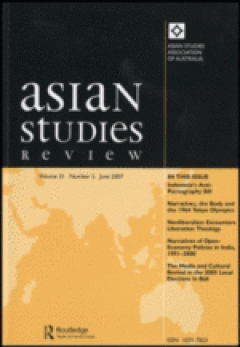
Representations of the Masculine in Tagame Gengoroh's Ero SM Manga
Tagame Gengoroh (1964-) is a Japanese manga writer who specialises in erotic gay male SM themed comics. Though prolific and having a substantial cult following in his native Japan, parts of the US and Europe, his work has not received the academic attention it deserves. This essay explores how Tagame constructs masculinity in three stories set in the context of wartime Japan. By drawing on seve…
- Edition
- Volume 34, Issue 4 December 2010 , pages 443 - 465
- ISBN/ISSN
- 10357823
- Collation
- -
- Series Title
- Asian Studies Review
- Call Number
- -

The Mystery of Capital: Eurasian Entrepreneurs' Socio-Cultural Strategies for…
Unlike economic capital, which is visible and easy to calculate, social capital is intangible and difficult to assess. Although both types of capital are crucial in determining social relations and social behaviour, little solid research has been done on the latter. This paper attempts to use the rags-to-riches story of Sir Robert Ho Tung, a first-generation Hong Kong Eurasian entrepreneur who …
- Edition
- Volume 34, Issue 4 December 2010 , pages 467 - 487
- ISBN/ISSN
- 10357823
- Collation
- -
- Series Title
- Asian Studies Review
- Call Number
- -

Exploring the Conditions for Cooperative Energy Governance: A Comparative Stu…
A central but often unasked question in political and sociological scholarship concerns the conditions that precipitate cooperation on large-scale transnational energy projects, especially among �developing� and �emerging� economies. Using the example of two multi-billion dollar pipeline systems - the Trans-ASEAN Natural Gas Pipeline (TAGP) Network in Southeast Asia and Baku-Tbilisi-Ceyhan (BTC…
- Edition
- Volume 34, Issue 4 December 2010 , pages 489 - 511
- ISBN/ISSN
- 10357823
- Collation
- -
- Series Title
- Asian Studies Review
- Call Number
- -
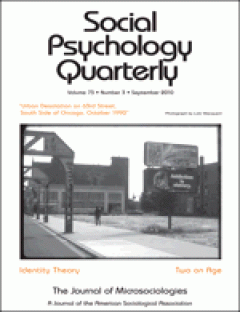
Emigration, Generation, and Collective Memories: The Presence of the Past for…
Research on memory of public events consistently reveals generational effects, where individuals remember best the events from their �critical years� of adolescence and early adulthood�a phenomenon attributed to privileged encoding or retrieval of memories due to primacy of experience. Prior research, however, has not decoupled the youthful period from transitional experiences more generally, r…
- Edition
- Vol. 73 no. 3, September 2010.pp. 223-244
- ISBN/ISSN
- 01902725
- Collation
- -
- Series Title
- Social Psychology Quarterly
- Call Number
- -

Age Identity in Context: Stress and the Subjective Side of Aging
The passage of time is fundamentally experienced through people�s interaction with their social worlds. Life-course scholars acknowledge the multiple aspects of time-based experience but have given little attention to age identity in a dynamic context. Drawing from a stress-process model, we expected that turbulence within people�s family relations and health declines would produce increases in…
- Edition
- Vol. 73 no. 3, September 2010.pp. 245-264
- ISBN/ISSN
- 01902725
- Collation
- -
- Series Title
- Social Psychology Quarterly
- Call Number
- -

Advice-implicative Interrogatives: Building “Client-centered” Support in …
Interactional research on advice giving has described advice as normative and asymmetric. In this paper we examine how these dimensions of advice are softened by counselors on a helpline for children and young people through the use of questions. Through what we term �advice-implicative interrogatives,� counselors ask clients about the relevance or applicability of a possible future course of a…
- Edition
- Vol. 73 no. 3, September 2010.pp. 265-287
- ISBN/ISSN
- 01902725
- Collation
- -
- Series Title
- Social Psychology Quarterly
- Call Number
- -

Gender and Entrepreneurship as a Career Choice: Do Self-assessments of Abilit…
The gender gap in entrepreneurship has typically been understood through women�s structural disadvantages in acquiring the resources relevant for successful business ownership. This study builds on resource-based approaches to investigate how cultural beliefs about gender influence the process by which individuals initially come to identify entrepreneurship as a viable labor-market option. Draw…
- Edition
- Vol. 73 no. 3, September 2010.pp. 288-304
- ISBN/ISSN
- 01902725
- Collation
- -
- Series Title
- Social Psychology Quarterly
- Call Number
- -
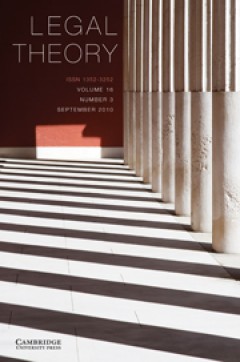
REVIEW OF TRUTH, ERROR, AND CRIMINAL LAW: AN ESSAY IN LEGAL EPISTEMOLOGY, BY …
In 1966 the U.S. Supreme Court wrote, �The basic purpose of a trial is the determination of truth.�1 This is Larry Laudan�s guiding premise in his �essay on legal epistemology.� Without ascertaining the facts about a crime, he writes, it is impossible to achieve justice, since a just resolution crucially depends on correctly figuring out who did what to whom.2 Thus, he continues, �it is en…
- Edition
- Volume 15, Number 1, March 2009, pp. 55-66
- ISBN/ISSN
- 1352-3252
- Collation
- -
- Series Title
- Legal Theory
- Call Number
- -

PRIVATE OWNERSHIP
The most powerful response to growing skepticism about the intelligibility of the idea of private ownership has been cast in terms of an owner's rights to the exclusive use of an object. In these pages, I argue that this response suffers from three basic deficiencies�rather than merely explanatory gaps�that render it unable to overcome the specter of skepticism. These deficiencies reflect a sha…
- Edition
- Vol. 16, No. 1, March 2010.pp. 1-35
- ISBN/ISSN
- 13523252
- Collation
- -
- Series Title
- Legal Theory
- Call Number
- -

GUILT, ANGER, AND RETRIBUTION
This article focuses primarily on the emotion of guilt as providing a justification for retributive legal punishment. In particular, I challenge the claim according to which guilt can function as part of our epistemic justification of positive retributivism, that is, the view that wrongdoing is both necessary and sufficient to justify punishment. I show that the argument to this conclusion rest…
- Edition
- Vol. 16, No. 1, March 2010. pp. 59-76
- ISBN/ISSN
- 13523252
- Collation
- -
- Series Title
- Legal Theory
- Call Number
- -

THE GETTIER PROBLEM AND LEGAL PROOF
This article explores the relationships between legal proof and fundamental epistemic concepts such as knowledge and justification. A survey of the legal literature reveals a confusing array of seemingly inconsistent proposals and presuppositions regarding these relationships. This article makes two contributions. First, it reconciles a number of apparent inconsistencies and tensions in account…
- Edition
- Vol. 16, No. 1, March 2010.pp. 37-57
- ISBN/ISSN
- 13523252
- Collation
- -
- Series Title
- Legal Theory
- Call Number
- -
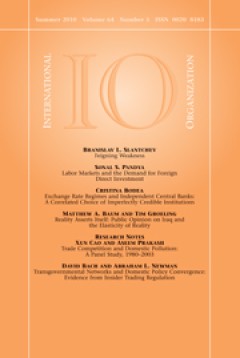
Goliath's Curse: Coercive Threats and Asymmetric Power
States typically issue compellent threats against considerably weaker adversaries, yet their threats often fail. Why? Expanding on a standard model of international crisis bargaining, I argue that a theory of reputation-building can help shed light on this puzzle. The model casts reputation as a strategic problem, showing that challengers issuing compellent threats have incentives to anticipate…
- Edition
- Vol. 64, No. 4, Fall 2010.pp. 627-660
- ISBN/ISSN
- 00208183
- Collation
- -
- Series Title
- International Organization
- Call Number
- -
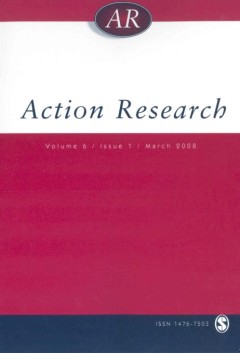
Final reflections, unanswered questions
The interest in theory is greater than we anticipated. However, in looking at the role of theory in action research, there are more questions than answers. With few exceptions, the way in which theory is built from experience remains elusive. How is it done? It seems that frameworks are useful in making sense of the world. But which frameworks? What do they leave out? How accessible are they to…
- Edition
- Volume 7, Issue 1. March 2009. pp. 117-120
- ISBN/ISSN
- 14767503
- Collation
- -
- Series Title
- Action Research
- Call Number
- -

Building emergent situated knowledges in participatory action research
Participatory action research (PAR) draws theoretically on the concepts of symbolic interactionism, particularly with regard to the collaborative construction and production of meanings. This article describes how action research builds meaningful theory at the local level thereby enabling researchers, researcher-participants and their local partners to foreground shared local understandings to…
- Edition
- Volume 7, Issue 1, March 2009. pp. 101-115
- ISBN/ISSN
- 14767503
- Collation
- -
- Series Title
- Action Research
- Call Number
- -
Theory in action research
In this prologue to the special issue on theory in action research we provide a context and an introduction for the articles that follow. We begin by sketching in some of our shared ideas on theory in action research and some of the differences between our own approaches. Then, after briefly describing the process of preparing this issue, we provide a succinct pointer to each article in the issue.
- Edition
- Volume 7, Issue 1, March 2009. pp. 5-12
- ISBN/ISSN
- 14767503
- Collation
- -
- Series Title
- Action Research
- Call Number
- -
The `f' word has everything to do with it, How feminist theories inform actio…
This article considers how feminist theories have and can contribute to action research, while acknowledging some of the tensions that arise when applying and building feminist theories. While feminist theorizing undoubtedly occurs in some action research, whether it is named or not, the gap appears to be in linking local knowledge to existing theoretical frameworks. Feminist theories, even tho…
- Edition
- Volume 7, Issue 1, March 2009. pp. 13-29
- ISBN/ISSN
- 1476-7503
- Collation
- -
- Series Title
- Action Research
- Call Number
- -
There is nothing so theoretical as good action research
The goal of this article is try to retrieve the idea of `good theory' that provides accessible and useful tools for practitioners, academics, and other participants in action research. In doing so, we advocate the importance of explicit theory building and testing as an integral part of action research practice. The association of theory with positivist research methodologies has resulted in th…
- Edition
- Volume 7, Issue 1, March 2009 pp. 31-47
- ISBN/ISSN
- 1476-7503
- Collation
- -
- Series Title
- Action Research
- Call Number
- -
Big returns for a little more investment, Mapping theory in emergent research
Action researchers can effectively uncover the theory embedded within inquiries by using a combination of analysis approaches and heuristic models already widely known. Presented here is one approach for mapping theory to capture elements of both program theory and theory of practice. Using a case of a Participatory Evaluative Action Research (PEAR), the article demonstrates how data collected …
- Edition
- Volume 7, Issue 1, March 2009. pp. 49-68
- ISBN/ISSN
- 1476-7503
- Collation
- -
- Series Title
- Action Research
- Call Number
- -

Building grounded theory in action research through the interplay of subjecti…
In this article, I contribute to the discourse on building theory within the context of action research. Specifically, drawing on advaita (non-dualism) philosophy from Hinduism, I describe a holistic framework which views life as holistic, that is, comprising both subjective and objective views of reality and thus promoting interplay between ontological subjectivity and epistemological objectiv…
- Edition
- Volume 7, Issue 1, March 2009. pp. 69-83
- ISBN/ISSN
- 1476-7503
- Collation
- -
- Series Title
- Action Research
- Call Number
- -

Generating living theory and understanding in action research studies
The paper explains how individuals can generate their living theories from action research as explanations for their educational influences in learning. The epistemological significance of these explanations is explored in terms of the energy and values that are expressed in explanatory principles of learning in enquiries of the kind, `How do I improve what I am doing?'. Limitations in the expr…
- Edition
- Volume 7, Issue 1, March 2009 pp. 85-99
- ISBN/ISSN
- 14767503
- Collation
- -
- Series Title
- Action Research
- Call Number
- -
 Computer Science, Information & General Works
Computer Science, Information & General Works  Philosophy & Psychology
Philosophy & Psychology  Religion
Religion  Social Sciences
Social Sciences  Language
Language  Pure Science
Pure Science  Applied Sciences
Applied Sciences  Art & Recreation
Art & Recreation  Literature
Literature  History & Geography
History & Geography